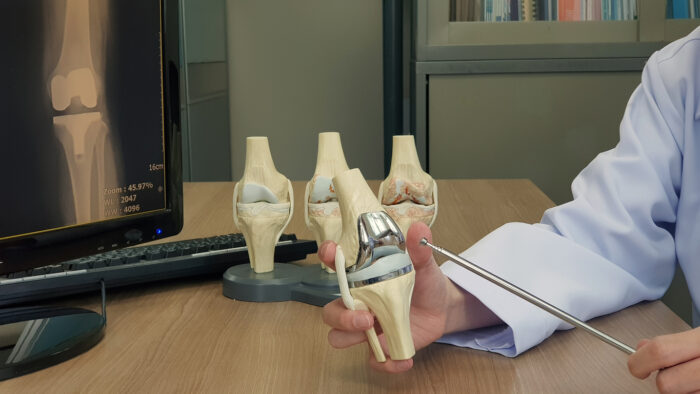
Explore the risks and complications of knee replacement surgery, including potential issues and how surgery abroad, especially in Lithuania, may minimise these risks.
Knee replacement surgery is a common and safe procedure. The majority of patients who undergo knee surgery have no complications. Even if patients experience some side effects, they are usually minor and easily treated.
However, like all surgical operations, knee surgery does carry some significant risks. These risks and complications are dependent, in part, on your age and general physical health. Your surgeon should explain these risks to you before you enter the operating room.
This article will cover the main risks and complications of knee surgery and how choosing knee replacement surgery abroad can reduce these aftereffects.
How Common are Knee Surgery Complications?
Knee replacement, or knee arthroplasty, has a high success rate. Potential complications include stiffness, clicking, possible infection, and blood clots. However, more severe complications can occur.
According to the American Academy of Orthopaedic Surgeons, serious problems occur in less than 2% of patients. That’s out of over 600,000 people who undergo knee replacement surgery annually in the United States. The data indicates that the risk of complications doubles in people over the age of 65.
It should be noted, however, that the United States does not have the best complication rates. Moreover, the risk of complications differs significantly from hospital to hospital.
Lithuania is known for the 2nd lowest number of complications following orthopaedic surgery. Why? Because of the high level of surgical expertise, postoperative rehabilitative support, and overall care.
Potential Risks and Complications of Knee Replacement Surgery

Knee Stiffness
Knee stiffness is by far the most common complaint after surgery. Usually, the problem isn’t the implant but the surrounding tissue. Nonetheless, such stiffness can cause difficulties in walking, bending down, or climbing stairs.
The standard management for knee stiffness is physical therapy and pain management. If the knee stiffness is deemed severe and persistent, a minor surgical intervention can help rectify the issue. In extremely rare cases, patients may require a second knee replacement.
Risk factors that may lead to a stiff knee joint following knee replacement surgery include:
- Pre-existing stiffness in the knee joint before undergoing surgery.
- A history of prior knee surgeries.
- The presence of other health conditions, such as diabetes, lung diseases, or depression.
- Inadequate pain management and/or physical therapy post-surgery.
Clicking or Clunking
Most artificial joints are made from plastic or metal. Because of these materials, some noise from the joint – particularly clicking, clunking, or popping – isn’t uncommon when the need bends. If the noise occurs without pain, then it’s not a problem.
Persistent pain associated with noise could indicate inflammation, soft tissue involvement, or a fault or breakage of the implant.
Ceramic knee replacements are less likely to create noise. However, with a higher price tag, many patients opt for the cheaper and more common plastic or metal alternatives.
Blood Clots

Blood clots are a significant risk for any operation. Because your legs are persistently immobilised during the operation and postoperative period, the blood can pool and begin to clot. This is called a deep vein thrombosis (DVT).
If a piece of this clot breaks off, it can move through the bloodstream until it reaches the lungs, causing a pulmonary embolism (PE). Some PEs are mild, but others can be life-threatening, depending on the size of the clot.
Due to the risk of blood clots, surgeons and physical therapists (PTs) are keen to mobilise patients as soon as possible. Lower leg exercises, calf pumps, and raising the legs can begin immediately following surgery to prevent clots from forming.
Other preventative measures include support stockings and blood-thinning medications like warfarin (Coumadin), heparin, enoxaparin (Lovenox), fondaparinux (Arixtra), or aspirin.
If you observe these symptoms in a particular region of your leg, they could indicate a Deep Vein Thrombosis (DVT):
- Redness
- Swelling
- Pain
- Warmth to the touch
Should you experience the following symptoms, it might suggest that a clot has travelled to the lungs:
- Shortness of breath
- Feelings of dizziness or light-headedness
- An accelerated heart rate
- A slight fever
- Coughing, which might sometimes include blood.
Infection
Infection is among the rarest potential complications following knee replacement surgery. If an infection does occur, it’s a severe complication and can risk the viability of the knee replacement.
Surgeons work hard to reduce the risk of infection. Operating theatres are highly hygienic and sterile, and antibiotics are often prescribed before, during, and after surgery – particularly in “at-risk” patients.
Certain individuals carry a greater risk of developing an infection. These include people with diabetes, HIV, and those taking immunosuppressant medication (e.g., following a transplant). If that’s the case, speak to the doctor about your options.
Look for signs of redness, soreness, or swelling after the operation. If you identify any of the signs and symptoms, seek immediate medical attention.
Anaesthesia Complications

Depending on the surgeon, you may undergo local or general anaesthesia. Local anaesthesia carries significantly less risk, but some individuals may still be allergic to the medication (although this is rare). General anaesthesia, on the other hand, can cause:
- Aches and pains
- Discomfort
- Dizziness
- Drowsiness
- Shivering
- Sore throat
- Vomiting
Reduce Complications with Knee Replacement Surgery Abroad
Kardiolita Hospital has earned a reputation for high-quality care, affordable prices, and, most importantly, a minimal risk of complications. As a Lithuanian hospital, it’s partly responsible for the exceedingly low rate of orthopaedic complications.
We achieve this result through our stringent sterile standards and high-level postoperative care. Our patients rarely face any complications, if at all.
That’s not the only benefit – compared to the knee surgery price in Ireland, we operate a fraction of the cost. Patients can expect to pay 10% of what they would otherwise pay.
Learn more about knee replacement surgery abroad. Send us an inquiry to start organising your operation.